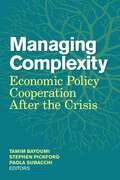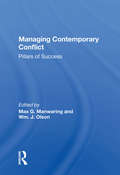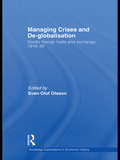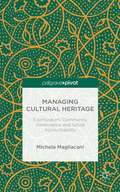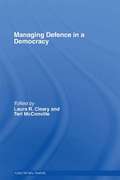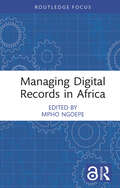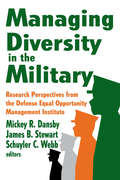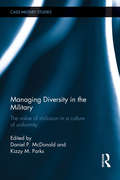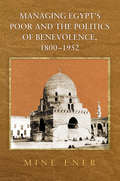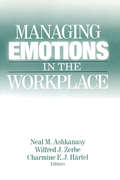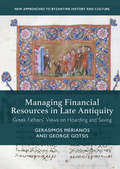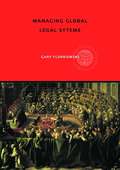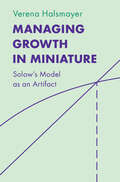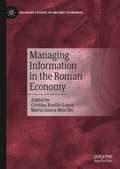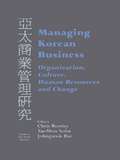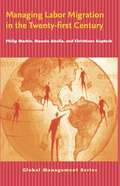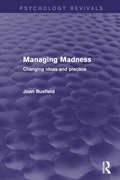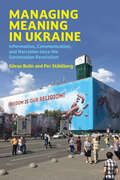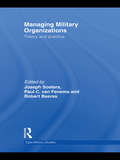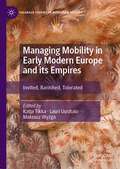- Table View
- List View
Managing Complexity: Economic Policy Cooperation after the Crisis
by Tamim Bayoumi Stephen Pickford Paola SubacchiA critical look at the challenges facing international policy cooperation in the new postcrisis environment. The global financial crisis of 2007-09 highlighted the economic interdependencies between all major countries, raising the issues of international cooperation. Managing Complexity: Economic Policy Cooperation after the Crisis looks at how, following the global financial crisis, countries have changed the way they cooperate with each otheron matters of economic policy. In this volume, the result of a joint research project of Chatham House and the International Monetary Fund, researchers and policymakers who were directly involved in the crisis take a critical look at the challenges facing international policy cooperation in the new postcrisis environment and at how the theory and practice of cooperation have evolved as a result of the crisis.
Managing Contemporary Conflict: Pillars Of Success
by Max G ManwaringDeparting from conventional policy rhetoric on the unconventional "new world disorder," Max G. Manwaring, Wm. J. Olson, and their colleagues here build upon Ambassador David C. Miller, Jr.'s three pillars of success for foreign policy and military management. They provide a sound intellectual road map through the dense fog of the contemporary inter
Managing Crises and De-Globalisation: Nordic Foreign Trade and Exchange 1919-1939
by Sven-Olof OlssonAs small, open economies the Nordic states have always been more dependent on foreign trade than larger powers, and have thus had a historic preference for free trade. But during the inter-war period the Nordic countries were squeezed between powerful and aggressive trading partners: above all Great Britain and Germany. Although the period between the end of the First World War and 1929 was marked by a return to a liberal world economy, the Great Depression ushered in a decade of protectionism. The bilateralisation of international trade was especially evident after Britain’s Ottawa treaties in 1932 and the Nazi seizure of power in 1933. Their dependence on trade with Britain and Germany meant that the Nordic countries were exposed to the full force of British and German bilateralism. The paradox is that in spite of international trade wars and regulated exchange the Nordic countries managed better than other European states during the interwar period, and that the Great Depression was not as deep or long lasting as in other countries. The chapters in this book discuss why and how this rather successful Nordic experience was achieved. The topics covered include commercial and monetary policies but also important industries such as forestry, agriculture and fishing. Many of the chapters are comparative and discuss economic developments in two or more Nordic countries.
Managing Cultural Heritage: Ecomuseum, Community Governance and Social Accountability
by Michela MagliacaniManaging Cultural Heritage explores managerial and governance issues within the cultural heritage sector, with particular regard to the ecomuseum. Moreover, a social accountability model is supplied to ecomuseums in order to be accountable towards its shareholder, the local community.
Managing Defence in a Democracy (Cass Military Studies)
by Laura R. Cleary Teri McConvilleAlthough each state is unique it is possible to identify certain common problems and issues with respect to defence governance and management. Governance and Management of Defence is a unique introduction to all the key principles of governance and management through the clear identification of these commonalities. The leading contributors that this volume brings together also show that if individuals are keen to reform practices within their defence establishments they need to be aware of the many constraints and obstacles that may challenge their endeavours. Each contributor is an acknowledged expert in their field and identifes examples of good practice from across the world and the steps taken to implement that practice. This new volume work supports teaching with accessible prompts for reflective activity. The editors recognize that many readers will not be native English speakers, so plain English is used throughout with international examples and case studies to make all the topics and themes clearly relevant and understandable. This is the ideal introductory text for any course that deals with management within the defence sector This book will be of great interest to all students of armed forces and defence management, politics and strategic and military studies.
Managing Digital Records in Africa
by Mpho NgoepeManaging Digital Records in Africa draws on the research work of the InterPARES Trust (ITrust) project that investigated interrelated archival issues focusing on legal analysis, infrastructure, trust, authentication, and education within the African context. This research-focused book provides a legal analysis and systematic assessment of how African institutions manage digital records in four countries (i.e., Botswana, Kenya, South Africa, and Zimbabwe). It also examines the extent to which records are managed using Internet-based applications, trust in such records, and digital record authentication to support the auditing process. Finally, it provides a curriculum analysis in digital records at institutions of higher learning in 38 African countries. The book's case studies illustrate the threads of discussion, which span the ITrust domains of legislation, infrastructure, authentication, trust, and education in archives and records management. The book can be used as a premier reference source by private and public organizations, researchers, educators, archivists, records managers, and postgraduate students to make informed decisions about digital records, records management systems, cloud-based services, authenticating records, and identifying universities on the continent that offer archival programmes. The book may also find expression to practitioners in other fields such as law and auditing.
Managing Diversity in the Military: Research Perspectives from the Defense Equal Opportunity Management Institute
by Mickey R. DansbyAlthough diversity is a twentieth-century term, as the United States continues through the twenty-first century, the issue of diversity in society and in organizations is becoming more complex. Managing Diversity in the Military addresses current equal opportunity and diversity issues and explores how the military is attempting to resolve them.The research presented reflects interests of scholars from various backgrounds who use different models, approaches, and methodologies, many of which are adapted from the study of civilian institutions. The work is divided into five sections ""Contemporary Approaches to Managing Diversity,"" ""Diversifying Leadership: Equity in Evaluation and Promotion,"" ""Gender Integration and Sexual Harassment,"" ""Military Discipline and Race,"" and ""Where Do We Go from Here?"" which proposes future research directions for equal opportunity and diversity management in the armed forces.All of the areas explored in this accessibly written volume have counterparts in the civilian sector. The book offers insights, practical methodologies, and effective management guidelines for commanders, civilian-sector executives, and human resource practitioners responsible for equal opportunity programs and outcomes. This is now the standard social research tool in an area of profound practical concerns.
Managing Diversity in the Military: The value of inclusion in a culture of uniformity (Cass Military Studies)
by Daniel P. McDonald Kizzy M. ParksThis edited book examines the management of diversity and inclusion in the military. Owing to the rise of asymmetric warfare, a shift in demographics and labor shortfalls, the US Department of Defense (DoD) has prioritized diversity and inclusion in its workforce management philosophy. In pursuing this objective, it must ensure the attractiveness of a military career by providing an inclusive environment for all personnel (active and reserve military, civilian, and contractors) to reach their potential and maximize their contributions to the organization. Research and practice alike provide substantial evidence of the benefits associated with diversity and inclusion in the workplace. Diversity and inclusion programs are more strategic in focus than equal opportunity programs and strive to capitalize on the strengths of the workforce, while minimizing the weaknesses that inhibit optimal organizational performance. This new book provides vital clarification on these distinct concepts, in addition to offering concrete best practices for the successful management of diversity and inclusion in the workplace. Written by scholars and practitioners, each chapter addresses major areas, raises crucial issues, and comments on future trends concerning diversity and inclusion in the workplace. The book will be of great interest to students of military studies, war and conflict studies, business management/HRM, psychology and politics in general, as well as to military professionals and leaders.
Managing Domestic Dissent in First World War Britain (British Politics and Society)
by Brock MillmanThe author argues that the way the British Government managed dissent during World War I is important for understanding the way that the war ended. He argues that a comprehensive and effective system of suppression had been developed by the war's end in 1918, with a greater level in reserve.
Managing Egypt's Poor and the Politics of Benevolence, 1800-1952
by Mine EnerThis richly textured social history recovers the voices and experiences of poor Egyptians--beggars, foundlings, the sick and maimed--giving them a history for the first time. As Mine Ener tells their fascinating stories alongside those of reformers, tourists, politicians, and philanthropists, she explores the economic, political, and colonial context that shaped poverty policy for a century and a half. While poverty and poverty relief have been extensively studied in the North American and European contexts, there has been little research done on the issue for the Middle East--and scant comprehensive presentation of the Islamic ethos that has guided charitable action in the region. Drawing on British and Egyptian archival sources, Ener documents transformations in poor relief, changing attitudes toward the public poor, the entrance of new state and private actors in the field of charity, the motivations behind their efforts, and the poor's use of programs created to help them. She also fosters a dialogue between Middle Eastern studies and those who study poverty relief elsewhere by explicitly comparing Egypt's poor relief to policies in Istanbul and also Western Europe, Russia, and North America. Heralding a new kind of research into how societies care for the destitute--and into the religious prerogatives that guide them--this book is one of the first in-depth studies of charity and philanthropy in a region whose social problems have never been of greater interest to the West.
Managing Emotion in Byzantium: Passions, Affects and Imaginings (Studies in Byzantine Cultural History)
by Susan Ashbrook Harvey Margaret MullettByzantinists entered the study of emotion with Henry Maguire’s ground-breaking article on sorrow, published in 1977. Since then, classicists and western medievalists have developed new ways of understanding how emotional communities work and where the ancients’ concepts of emotion differ from our own, and Byzantinists have begun to consider emotions other than sorrow. It is time to look at what is distinctive about Byzantine emotion. This volume is the first to look at the constellation of Byzantine emotions. Originating at an international colloquium at Dumbarton Oaks, these papers address issues such as power, gender, rhetoric, or asceticism in Byzantine society through the lens of a single emotion or cluster of emotions. Contributors focus not only on the construction of emotions with respect to perception and cognition but also explore how emotions were communicated and exchanged across broad (multi)linguistic, political and social boundaries. Priorities are twofold: to arrive at an understanding of what the Byzantines thought of as emotions and to comprehend how theory shaped their appraisal of reality. Managing Emotion in Byzantium will appeal to researchers and students alike interested in Byzantine perceptions of emotion, Byzantine Culture, and medieval perceptions of emotion.
Managing Emotions in the Workplace (Research On Emotion In Organizations Ser.)
by Neal M. Ashkanasy Wilfred J. Zerbe Charmine E. HartelThe modern workplace is often thought of as cold and rational, as no place for the experience and expression of emotions. Yet it is no more emotionless than any other aspect of life. Individuals bring their affective states and emotional "buttons" to work, leaders try to engender feelings of passion and enthusiasm for the organization and its mission, and consultants seek to increase job satisfaction, commitment, and trust. This book advances the understanding of the causes and effects of emotions at work and extends existing theories to consider implications for the management of emotions. The international cast of authors examines the practical issues raised when organizations are studied as places where emotions are aroused, suppressed, used, and avoided. This book also joins the debate on how organizations and individuals ought to manage emotions in the workplace. Managing Emotions in the Workplace is designed for use in graduate level courses in Organizational Behavior, Human Resource Management, or Organizational Development - any course in which the role of emotions in the workplace is a central concern. Scholars and consultants will also find this book to be an essential resource on the latest theory and practice in this emerging field.
Managing Financial Crises Recent Experience and Lessons for Latin America
by Charles Collyns G. Russell KincaidA report from the International Monetary Fund.
Managing Financial Resources in Late Antiquity: Greek Fathers' Views On Hoarding And Saving (New Approaches To Byzantine History And Culture Ser.)
by George Gotsis Gerasimos MerianosThis book examines the views of Greek Church Fathers on hoarding, saving, and management of economic surplus, and their development primarily in urban centres of the Eastern Mediterranean, from the late first to the fifth century. The study shows how the approaches of Greek Fathers, such as Clement of Alexandria, Basil of Caesarea, John Chrysostom, Isidore of Pelusium, and Theodoret of Cyrrhus, to hoarding and saving intertwined with stances toward the moral and social obligations of the wealthy. It also demonstrates how these Fathers responded to conditions and practices in urban economic environments characterized by sharp inequalities. Their attitudes reflect the gradual widening of Christian congregations, but also the consequences of the socio-economic evolution of the late antique Eastern Roman Empire. Among the issues discussed in the book are the justification of wealth, alternatives to hoarding, and the reception of patristic views by contemporaries.
Managing Global Legal Systems: International Employment Regulation and Competitive Advantage (Global HRM)
by Gary W. FlorkowskiPresenting a framework for understanding the corporate strategy-public policy interface as it relates to human capital management, this unique text treats legal systems as factors that must be actively managed in the firm’s larger pursuit of international competitive advantage. It provides readers with the most comprehensive description to date of the role that transnational, regional and national institutions play in the evolution of domestic employment regulation and international labour standards, and discusses the opportunities that employers have to influence their form and application. High-profile news events from around the world are utilized to illustrate key concepts, offering unique insights into the regulatory environment that MNEs face when managing an international work force. Taking an applied approach to the subject of labour-market regulation on six continents, this book is a valuable reference for students and practitioners alike in the fields of HRM, business management and law.
Managing Growth in Miniature: Solow's Model as an Artifact (Historical Perspectives on Modern Economics)
by Verena HalsmayerManaging Growth in Miniature explores the history of the way economists think about growth. It focuses on the period between the 1930s and 1960s, tracing the development of the famed 'Solow growth model,' one of the central mathematical models in postwar economics. It argues that models are not simply 'efficient tools' providing answers to the problems of economic theory and governance. The Solow model's various uses and interpretations related not only to the ways it made things (in)visible, excluded questions, and suggested actions. Its 'success' and effects ultimately also pertained to its fundamental ambiguities. Attending to the concrete sides of economic abstractions, this book provides a richly layered and accessible account of the forms of knowledge that shaped the predominant notion of 'economic growth' and ideas of how to govern it.
Managing Inequality: Northern Racial Liberalism in Interwar Detroit
by Karen R. MillerIn Managing Inequality, Karen R. Miller examines the formulation, uses, and growing political importance of northern racial liberalism in Detroit between the two World Wars.In the wake of the Civil War, many white northern leaders supported race-neutral laws and anti-discrimination statutes. These positions helped amplify the distinctions they drew between their political economic system, which they saw as forward-thinking in its promotion of free market capitalism, and the now vanquished southern system, which had been built on slavery. But this interest in legal race neutrality should not be mistaken for an effort to integrate northern African Americans into the state or society on an equal footing with whites. During the Great Migration, which brought tens of thousands of African Americans into Northern cities after World War I, white northern leaders faced new challenges from both white and African American activists and were pushed to manage race relations in a more formalized and proactive manner. The result was northern racial liberalism: the idea that all Americans, regardless of race, should be politically equal, but that the state cannot and indeed should not enforce racial equality by interfering with existing social or economic relations. Miller argues that racial inequality was built into the liberal state at its inception, rather than produced by antagonists of liberalism. Managing Inequality shows that our current racial system—where race neutral language coincides with extreme racial inequalities that appear natural rather than political—has a history that is deeply embedded in contemporary governmental systems and political economies.
Managing Information in the Roman Economy (Palgrave Studies in Ancient Economies)
by Marta García Morcillo Cristina Rosillo-LópezThis volume studies information as an economic resource in the Roman World. Information asymmetry is a distinguishing phenomenon of any human relationship. From an economic perspective, private or hidden information, opposed to publicly observable information, generates advantages and inequalities; at the same time, it is a source of profit, legal and illegal, and of transaction costs. The contributions that make up the present book aim to deepen our understanding of the economy of Ancient Rome by identifying and analysing formal and informal systems of knowledge and institutions that contributed to control, manage, restrict and enhance information. The chapters scrutinize the impact of information asymmetries on specific economic sectors, such as the labour market and the market of real estate, as well as the world of professional associations and trading networks. It further discusses structures and institutions that facilitated and regulated economic information in the public and the private spheres, such as market places, auctions, financial mechanisms and instruments, state treasures and archives. Managing Asymmetric Information in the Roman Economy invites the reader to evaluate economic activities within a larger collective mental, social, and political framework, and aims ultimately to test the applicability of tools and ideas from theoretical frameworks such as the Economics of Information to ancient and comparative historical research.
Managing Korean Business: Organization, Culture, Human Resources and Change (Studies In Asia Pacific Business)
by Chris Rowley Johngseok Bae Tae-Won SohnDuring the 1990s the Korean economy was regarded as a possible "role model" to be followed by other newly industrializing economies, but the "Asian Crisis" of 1997 destroyed this image. Past practices, challenges and responses are explored in this collection by an international group of authors.
Managing Labor Migration in the Twenty-first Century
by Philip Martin Manolo Abella Christiane KuptschWhy have ninety million workers around the globe left their homes for employment in other countries? What can be done to ensure that international labor migration is a force for global betterment? This groundbreaking book presents the most comprehensive analysis of the causes and effects of labor migration available, and it recommends sensible, sustainable migration policies that are fair to migrants and to the countries that open their doors to them. The authors survey recent trends in international migration for employment and demonstrate that the flow of authorized and illegal workers over borders presents a formidable challenge in countries and regions throughout the world. They note that not all migration is from undeveloped to developed countries and discuss the murky relations between immigration policies and politics. The book concludes with specific recommendations for justly managing the world's growing migrant workforce.
Managing Madness: Changing Ideas and Practice (Psychology Revivals)
by Joan BusfieldPsychiatry regularly comes under attack as a way of caring for and controlling the mentally ill. Originally published in 1986, this title explores the history and theory of psychiatry to illuminate current practice at the time, and shows why mental health services had developed in particular ways. The book was invaluable for all those who needed to understand the problems and processes behind current psychiatric practice at the time – sociologists and psychologists, psychiatrists and doctors, social workers, and health service planners and administrators – and will still be of historical interest today.
Managing Madness: Weyburn Mental Hospital and the Transformation of Psychiatric Care in Canada
by Tracey Mitchell Erika Dyck Alexander Dyck John Mills Alex Deighton Hugh Lafave John Elias Gary GerberThe Saskatchewan Mental Hospital at Weyburn has played a significant role in the history of psychiatric services, mental health research, and providing care in the community. Its history provides a window to the changing nature of mental health services over the 20th century. Built in 1921, Saskatchewan Mental Hospital was considered the last asylum in North America and the largest facility of its kind in the British Commonwealth. A decade later the Canadian Committee for Mental Hygiene cited it as one of the worst facilities in the country, largely due to extreme overcrowding. In the 1950s the Saskatchewan Mental Hospital again attracted international attention for engaging in controversial therapeutic interventions, including treatments using LSD. In the 1960s, sweeping healthcare reforms took hold in the province and mental health institutions underwent dramatic changes as they began transferring patients into communities. As the patient and staff population shrunk, the once palatial building fell into disrepair, the asylum’s expansive farmland went out of cultivation, and mental health services folded into a complicated web of social and correctional services. Erika Dyck’s "Managing Madness" examines an institution that housed people we struggle to understand, help, or even try to change.
Managing Meaning in Ukraine: Information, Communication, and Narration since the Euromaidan Revolution
by Goran Bolin Per StahlbergAn in-depth look at Ukraine&’s attempts to shape how it is perceived by the rest of the world.During times of crisis, competing narratives are often advanced to define what is happening, and the stakes of information management by nations are high. In this timely book, Göran Bolin and Per Ståhlberg examine the fraught intersection of state politics, corporate business, and civil activism to understand the dynamics and importance of meaning management in Ukraine. Drawing on fieldwork inside the country, the authors discuss the forms, agents, and platforms within the complex political and communicative situation and how each articulated and acted upon perceptions of the propaganda threat.Bolin and Ståhlberg focus their analysis on the period between 2013 and 2022, when political tensions, commercial dynamics, and new communication technologies bred novel forms of information management. As they show, entities from governments and governmental administration to commercial actors, entrepreneurs, and activists formed new alliances in order to claim a stake in information policy. Bolin and Ståhlberg also explore how the various agents engaged in information management and strove to manage meaning in communication practice; the communicative tools they took advantage of; and the subsequent consequences for narrative constructions.
Managing Military Organizations: Theory and Practice (Cass Military Studies)
by Joseph SoetersThis book deals with the processes and theories involved in managing military organisations in both peacetime and crisis conditions. Examining the challenges faced by policymakers and military commanders in conducting military operations, this book considers the benefits of conventional management and organisation theory for the military. At the same time, these essays recognise that the military should be considered as a highly individual organisation, operating in exceptional circumstances. This awareness of the differences between the military and other organisations generates important lessons not only for the military but also for general organisations as it teaches them how to cope in exceptional, ‘hyper’ conditions. These theoretical lessons are illustrated by case studies and experiences from recent military operations, such as those in Iraq and Afghanistan. This book will be of great interest to students of military studies, security studies and organizational studies. Joseph Soeters chairs the department of management and organization studies and defence economy at the Netherlands Defense Academy and he is a professor in organizational sociology at Tilburg University. Paul. C. van Fenema is an associate professor of organization studies at the Netherlands Defence Academy and Tilburg University. Robert Beeres is an associate professor in the field of defence accounting and control (business administration) at the Netherlands Defence Academy and at Nyenrode Business School.
Managing Mobility in Early Modern Europe and its Empires: Invited, Banished, Tolerated (Palgrave Studies in Migration History)
by Katja Tikka Lauri Uusitalo Mateusz WyżgaThis book examines how migration and mobility were controlled, supported, and restricted in early modern Europe and European colonies. The aim of the book is to investigate how different actors, such as rulers, regional lords, local authorities, and corporations tried to regulate different forms of mobility and how those on the move reacted to these attempts. The book examines the agency of both the authorities and the migrants, shifting focus between the macro and the micro level. The chapters will also illuminate the ways gender, religion, language, ethnicity, occupation, and socioeconomic status were entangled in the regulations concerning mobility. Control of migration is inextricably linked with power relations. In this book, mobility is seen as a wide social process, which covers daily or seasonal movement as well as less or more stable migration.
